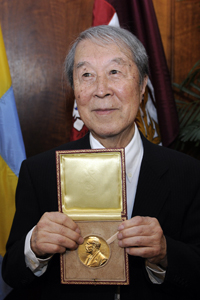Chicago In the News
The Chronicle’s biweekly column Chicago In the News offers a digest of commentary and quotations by a few of the University faculty members, students and alumni who have been headlining the news in recent weeks. Chicago faculty members are some of the most frequently quoted experts, so space allows publishing references to only selected examples. To read many of the full newspaper articles mentioned in this column, visit the University News Office Web site: http://news.uchicago.edu.
Zimmer answers ‘the question’
President Zimmer wrote a mock college admissions essay, along with a number of fellow university leaders, which was published in the Wednesday, May 6 edition of the Wall Street Journal. Zimmer responded to Rainer Maria Rilke’s quote: “At present you need to live the question.” He wrote, “‘Live the question’ is beyond a poetic exhortation. It is a way of thinking and an approach to the world—one that demands rigorous argument but discovers in that challenge enthusiasm for ideas and a power to transform lives and society.” Zimmer wrote that living the question requires “argument and engagement” as well as “intellectual risk-taking.” Also important is questioning, he wrote: “Often, different arguments relating to a question point in opposing directions. And inevitably, the initial question leads to new queries.”
 Photo by Dan Dry Yoichiro Nambu |
|
Nobelist makes Time’s top 100
Yoichiro Nambu, the Harry Pratt Judson Distinguished Service Professor Emeritus in Physics, was named one of “Time’s 100 Most Influential People” in its Saturday, May 2 issue. Nambu shared the 2008 Nobel Prize in Physics for his “discovery of the mechanism of spontaneous broken symmetry in subatomic physics.” The article stated that Nambu survived service in the Imperial Army in Japan to arrive at the Institute for Advanced Study in Princeton, N.J., where he met Albert Einstein. Einstein’s unfulfilled goal was to find a unified field theory tying together the forces of nature, a problem that Nambu tackled with his theories.
Can’t afford sick days
WBEZ Radio interviewed Tom Smith, Director of the General Social Survey at the National Opinion Research Center, on Tuesday, May 5 about workers forgoing sick days to keep their jobs. Smith said that 68 percent of people without paid sick days have gone to work with a contagious illness, due to the pressures of the tenuous job market. “We found that one out of every six workers have actually been fired, demoted or otherwise punished for taking time off because they weren’t covered by paid sick days,” Smith said. The piece cited an advocacy group that found 85 percent of food service workers don’t have paid sick days, compared to only 16 percent of those in the legal profession.
Obama’s judicial philosophy
Former colleagues and students weighed in on President Obama’s judicial philosophy in the Sunday, May 3 New York Times, in lieu of his pending nomination for the United States Supreme Court. The article characterized Obama’s hope for a justice who would be more of a “careful pragmatist with a limited view of the role of the courts.” Despite his call for change in the presidential election, Obama believes the court should never be too far or behind the public, the article states. “I would imagine that if Barack had a free hand to appoint judges without having to worry about confirmations, about politics, that his idea of a great justice would be someone like a Thurgood Marshall,” said Geoffrey Stone, the Edward H. Levi Distinguished Service Professor in the Law School and the College. The article also quoted David Strauss, the Gerald Ratner Distinguished Service Professor in the Law School.
Professor: Novel alive and well
Thomas Pavel, the Gordon J. Laing Distinguished Service Professor in Romance Languages & Literatures and the College, spoke about the future of the novel in a Friday, May 8 article in the Chicago Tribune. The author wrote of a loss of his attention span and lack of appetite for book reading amid the age of the Internet. Yet judging from the number of titles published, Pavel argued that novels are more popular now than they’ve been in their nearly 300-year existence, after having survived the creation of film and television in the 20th century. “You have to read [online]. You have to write,” Pavel said. “In a sense, every single activity which increases your language skills is not really competing with the novel.”
Quick cure for new viruses
A Saturday, May 2 article carried by Reuters news service described the hopes of University researchers who want to develop vaccines that could fight dangerous new flu viruses such as H1N1. Patrick Wilson, Assistant Professor in Rheumatology, along with a colleague at Emory University plan to quickly develop targeted, infection-fighting proteins called monoclonal antibodies. This “emergency science” can make influenza antibodies in as little as a month and could be useful in a pandemic. “If they find some of these antibodies that are really good at neutralizing this flu, the potential is there to use it as a therapy,” Wilson said. He added the therapy would offer only temporary immunity; a vaccine could take four to six months.
![[Chronicle]](/images/sidebar_header_oct06.gif)